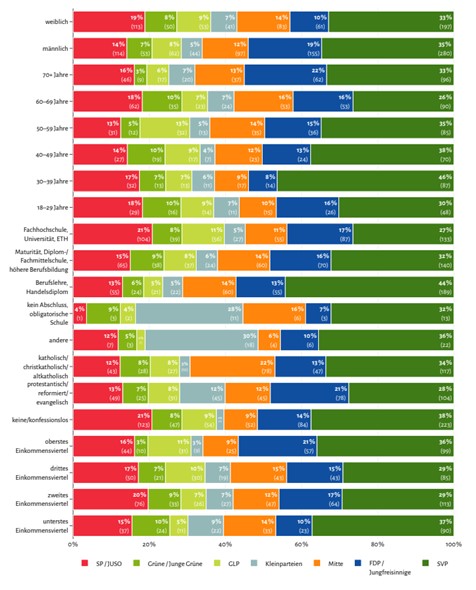
Aargau cantonal elections: the SVP scored well among young people
The SVP achieved a new record in the 2024 Aargau cantonal elections. It benefited from the fact that many voters considered immigration to be the biggest problem. The SVP managed to retain a large part of its 2020 electorate, mobilise non-voters and win votes from other parties. Unlike in the past, the People’s Party also performed well among younger voters. This is shown by the post-election survey conducted by FOKUS Aargau at the Centre for Democracy Studies Aarau (ZDA).
The recent elections to the Aargau cantonal parliament resulted in a strengthening of the conservative forces. The SVP emerged as the big winner, increasing its share of the vote to 33.9 per cent – a historic high. The Greens, on the other hand, suffered a bitter defeat and lost four seats in the cantonal parliament. The SVP benefited from the fact that immigration was a burning issue for voters. 23 per cent of voters considered this topic to be the most important political issue. Of those who were primarily concerned about the SVP’s core issue, 69 per cent voted for the People’s Party.
Rising health insurance premiums (18 percent) were also a major issue. However, none of the six largest parties in Aargau managed to gain a decisive advantage from the explosive nature of this issue. In this constellation of issues, the SVP managed to keep its base on board: around two-thirds of its 2020 electorate remained loyal to the People’s Party. It also succeeded in mobilising non-voters and making strong gains from other parties – in particular the FDP and, surprisingly, the Greens.
It is also noteworthy that the SVP was very popular among younger voters. Unlike in the past, older voters no longer dominate the party’s support base. The party even achieved its highest share of the vote among 30- to 39-year-olds, with 46 per cent of voters in this age group casting their ballots for the People’s Party.
Study author Laurent Bernhard says: «This finding is not surprising, given that various right-wing parties in Europe are currently scoring points with young people with their identitarian agenda. The Aargau SVP has now succeeded in doing the same.»

Fig. 1: Party votes in the 2024 Grand Council election by socio-demographic characteristics (only material voters, i.e. excluding blank votes)
The «green wave» has subsided
The Greens and the Green Liberals suffered from the fact that climate change no longer dominated the political debate. Their core issue and driver of success in 2020 was only cited as the most important problem by 9 percent of voters. The so-called «green wave» has thus subsided.
The Greens were the least successful in retaining their 2020 electorate: only 43 per cent voted for them again, with the rest either not participating in the last cantonal elections or preferring other parties. At the same time, the Greens lost many voters to the SP and the SVP.
Although the GLP was able to win over the largest proportion of late deciders (30 per cent), it ultimately lost 8 per cent of its former electorate to its competitors. These losses went in various directions – most frequently to the SVP, followed by the SP and the centre.
Demobilisation of the SP electorate
Despite receiving numerous votes from former Green Party voters, the SP was unable to increase its overall share of the vote. This was primarily due to the fact that many SP voters from 2020 stayed away from the polls. The Social Democrats were unable to compensate for these losses by mobilising previous non-voters. This resulted in a net loss of 9 per cent compared to the 2020 voter share.
The centre, on the other hand, succeeded in mobilising non-voters. At the same time, however, it lost an above-average number of votes to rival parties, above all to the SVP. This suggests that, in terms of the composition of the electorate, there was more movement in the centre than the stable voter share would suggest.
The FDP electorate had the highest average age at 57. Like the SVP, the Liberals managed to retain two-thirds of their 2020 electorate. They also succeeded in mobilising non-voters. In addition, the FDP gained ground at the expense of the EVP, the Centre Party and the Greens. However, many votes were lost to the SVP, which meant that the inflows and outflows balanced each other out overall.
Further resources
The study
This study is based on a survey of 2,042 eligible voters in Aargau conducted as part of the «FOKUS Aargau» study on the Aargau cantonal elections on 29 October 2024. FOKUS Aargau is financed by the Swisslos Fund of the Canton of Aargau. The data was collected by DemoSCOPE, while the analyses were carried out by the Centre for Democracy Aarau (ZDA). The final reports and further analyses are available on the website www.analysen.fokus.ag a few weeks after the referendum or election date. The questionnaires used in the studies are freely accessible on the same page.
Download
Contact
Dr. Laurent Bernhard
laurent.bernhard@zda.uzh.ch
About the Centre for Democracy Studies Aarau (CDA)
The Centre for Democracy Studies Aarau is a scientific research centre supported by the University of Zurich, the University of Applied Sciences and Arts Northwestern Switzerland, the Canton of Aargau and the City of Aarau. It conducts basic research and addresses current issues relating to democracy – regionally, nationally and globally: www.zdaarau.ch